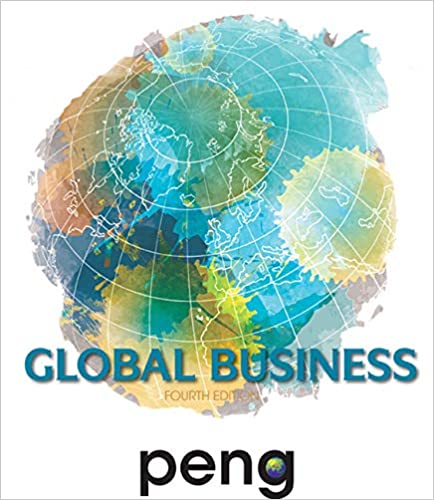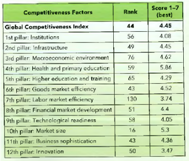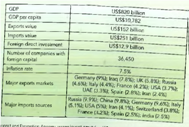
Global Business 4th Edition by Mike Peng
Edition 4ISBN: 978-1305500891
Global Business 4th Edition by Mike Peng
Edition 4ISBN: 978-1305500891 Exercise 29
Would You Invest in Turkey 1
Canan Mutlu (University of Texas at Dallas)
Turkey has tremendous economic dynamism and potential, but also some nontrivial problems. Can Turkey attract investors
What do countries do to attract investors The answer to this question usually involves improving infrastructure, increasing standards of living, and ultimately making doing business easier and less costly for investors. However, in today's world, an increasing number of countries are also running campaigns all over the world to attract investors' attention and increase awareness about their countries' business op por tu n ities. Turkey is one o f the emerging economies with an impressive campaign with the running title of "Invest in Turkey."
Turkey is the 18th-largest economy in the world with a per capita income that has nearly tripled in less than a decade and now exceeds US$10,000. Turkey is a transcontinental country with lan d spanning from Southeastern Europe to Western Asia. The majority of Turkey's land is known as Asia Minor or the Anatolian peninsula, which is bounded by the Black Sea to the north, the Mediterranean Sea to the south, and the Aegean Sea to the west. Turkey's location enables the country to have a unique brokerage position between Europe and Asia. In fact, you can see the "Welcome to Europe" and "Welcome to Asia" signs at the two exits of the bridges in Istanbul that unite both continents over the Bosphorus strait. Turkey is not only a geographically but also a historically attractive land, thanks to its roots that date back to the ancient Greece, Rome, the Byzantines, the Ottoman Empire, and Central Asia.
However, all these unique qualities do not guarantee a competitive advantage for Turkey and make it a better country to invest. Well-known management scholar Michael Porter argues that national prosperity is created, not inherited. Accordingly, one o f the most comprehensive assessments of national competitiveness, Global Competitiveness Report, evaluates the competitiveness of 148 economies, providing insight into the drivers of their productivity and prosperity. In 2013, Turkey ranked 44th among 148 countries (Exhibit 1). During the last decade, due to its vibrant business environment, Turkey has shown stronger economic growth than many European counterparts. This is mostly fueled by a large domestic market (ranked 16th) and intense local competition (ranked 15th). However, in order to sustain the economic growth, the country needs to shift its focus into areas such as education and training to increase its competitiveness in labor market efficiency (ranked 130th). Overall, Turkey shows an increasing trend in terms of economic growth, market size, and market efficiency. However, there are still problematic areas, such as intellectual property protection, judicial independence, educational system, energy costs, and effect of taxation on incentives to invest that raise serious red flags for the sustainability o f economic growth.
Economic Growth and Investment
Due to major economic and structural reforms, Turkey has rapidly turned into a major recipient of foreign direct investment (FDI) and increased its integration with the global economy, accompanied by steady economic growth over the last decade. The goals o f the new reforms include increasing the role o f private sector and encouraging entrepreneurs to pursue their startups to inject new blood to the economy (Exhibit 2). A solid outcome o f these initiatives has been the average gross domestic product (GDP) growth rate of 5.4% between 2002 and 2011, compared to 1.6% in the United States and 1.4% in European Union.
The majority of Turkey's trade is with Europe and the Middle East. In addition to the Customs Union Agreement with the European Union (EU), Turkey also enjoys free trade agreements (FTAs) with Albania, Bosnia and Herzegovina, Chile, Croatia, EFTA member countries (Iceland, Liechtenstein, Norway, and Switzerland), Egypt, Georgia, Israel, Jordan, Macedonia, Montenegro, Morocco, Palestine, Serbia, South Korea, Syria, and Tunisia. Its largest export markets are Germany, Iraq, and Britain. Its import markets are mostly driven by Russia, China, and Germany. Turkey has also shown roaring FDI inflows increasing from US$8.6 billion in 2009 to US$12.9 billion in 2013. The majority o f the FDI flows to industrial sectors, man u facturing, and service areas and is dominantly from Europe followed by Near Eastern and Middle Eastern countries. Turkey has especially become an attractive destination for wealthy Middle East investors who search for more secure shores outside of countries riddled with unrest from the Arab Spring.
Given the economic growth, Turkey is now considered a New Tiger amaong forien investors. One of the leading reasons for this nick name is Turkey's successful weathering of the 2008-2009 global economic crisis driven by modren infrastucture, economic reforms, and also the young and dynamic workforce enabling an attractive investment site. As of 2013, with 76.6 million citizens with a median age of 30, Turkey is the second most populous country after Germany and has the youngest population fules the nation's ambition towards becoming a major hub of manufacturing and innovation.
The EU Agenda and Problematic Borders
Turkey has a complicated relationship with the EU, although the EU is Turkey's largest economic partner, accounting for 46% of Turkish trade in 2011. Becoming a candidate for full membership in the EU in 1999, Turkey has long been at the door of the EU to become a full member. Accession negotiations have led to numerous institutional reforms benchmarked on the EU standards, yet could not end in fu ll membership because of a number o f political obstacles and particularly problematic borders. Surrounded by Armenia, Azerbaijan, Bulgaria, Georgia, Greece, Syria, Iran, and Iraq, Turkey borders potential war zones and, thus, is under the influence o f roaring political conflicts. Turkey is not only confronted by problematic borders, bu t also faces social conflicts within its own borders.
For example, du rin g the Spring of 2013, Turkey witnessed one o f the largest social unrests, referred to as Gezi Protests, which included a wide range o f complaints such as issues of freedom of the press, increasing authoritarianism, the war in Syria, and concerns over secularism. A ll these problems lead to ongoing political instability and social tensions within the country, increasing business risks and adding weights on investor confidence on the business environment.
Despite certain problems, Turkey is a stable democratic country in one o f the most unstable parts o f the globe. Given its growth potential and ongoing concerns, it is viewed as a "high risk, high return" option among investors. Therefore, although the country's economic outlook remains favorable compared to the rest o f Europe, there remains ample room for improvement. While Turkey has been resilient to the recent global financial crisis, its challenge is to increase competitiveness and ultimately to sustain economic growth. To continue to be a safe house in a volatile neighborhood, Turkey needs to speed up institutional reforms in areas such as judiciary system to promote a less-volatile investment environment and also sharpen the educational system to shape the young population into skilled workers. Turkey is not only at the crossroads between East and West, but also sits at the thin line between emerging and advanced economies. Future reforms will determine whether the country will become an economic power house or stay as a foreveremerging economy.
1)This case was written by Canan Mutlu (University of Texas at Dallas) under the supervision of Professor Mike Peng. All information used is from the public domain and the author is responsible for any errors. © Canan Mutlu.
Sources: Based on (1) Bloomberg Businessweek, 2012, Move over, BRICs, here come the MISTs, August 9, www.businessweek.com/articles/2012-08-09/move-over-brics-dot-here-come-the-mists; (2) CNBC, 2012, Investing in Europe's fastest-growing economy, www.cnbc.com/id/48552347; (3) Global Competitiveness Report 2013-2014, www.weforum.org/issues/global-competitiveness; (4) Invest in Turkey, 2014, www.invest.gov.tr/en-US/Pages/Home.aspx.
Exhibit 1 Turkey's Competitiveness Outlook
Source: The Global Competitiveness Index 2013-2014

Exhibit 2 Turkey's Economic Outlook in 2013
Source: Turkey Investment Support and Promotion Agency, www.invest.gov.tr/en-US/turkey/factsandfigures/pages/TRSnapshot.aspx

As an executive of a multinational based in Australia that is interested in undertaking FDI in emerging economies, would you be interested in investing in Turkey among many options around the world
Canan Mutlu (University of Texas at Dallas)
Turkey has tremendous economic dynamism and potential, but also some nontrivial problems. Can Turkey attract investors
What do countries do to attract investors The answer to this question usually involves improving infrastructure, increasing standards of living, and ultimately making doing business easier and less costly for investors. However, in today's world, an increasing number of countries are also running campaigns all over the world to attract investors' attention and increase awareness about their countries' business op por tu n ities. Turkey is one o f the emerging economies with an impressive campaign with the running title of "Invest in Turkey."
Turkey is the 18th-largest economy in the world with a per capita income that has nearly tripled in less than a decade and now exceeds US$10,000. Turkey is a transcontinental country with lan d spanning from Southeastern Europe to Western Asia. The majority of Turkey's land is known as Asia Minor or the Anatolian peninsula, which is bounded by the Black Sea to the north, the Mediterranean Sea to the south, and the Aegean Sea to the west. Turkey's location enables the country to have a unique brokerage position between Europe and Asia. In fact, you can see the "Welcome to Europe" and "Welcome to Asia" signs at the two exits of the bridges in Istanbul that unite both continents over the Bosphorus strait. Turkey is not only a geographically but also a historically attractive land, thanks to its roots that date back to the ancient Greece, Rome, the Byzantines, the Ottoman Empire, and Central Asia.
However, all these unique qualities do not guarantee a competitive advantage for Turkey and make it a better country to invest. Well-known management scholar Michael Porter argues that national prosperity is created, not inherited. Accordingly, one o f the most comprehensive assessments of national competitiveness, Global Competitiveness Report, evaluates the competitiveness of 148 economies, providing insight into the drivers of their productivity and prosperity. In 2013, Turkey ranked 44th among 148 countries (Exhibit 1). During the last decade, due to its vibrant business environment, Turkey has shown stronger economic growth than many European counterparts. This is mostly fueled by a large domestic market (ranked 16th) and intense local competition (ranked 15th). However, in order to sustain the economic growth, the country needs to shift its focus into areas such as education and training to increase its competitiveness in labor market efficiency (ranked 130th). Overall, Turkey shows an increasing trend in terms of economic growth, market size, and market efficiency. However, there are still problematic areas, such as intellectual property protection, judicial independence, educational system, energy costs, and effect of taxation on incentives to invest that raise serious red flags for the sustainability o f economic growth.
Economic Growth and Investment
Due to major economic and structural reforms, Turkey has rapidly turned into a major recipient of foreign direct investment (FDI) and increased its integration with the global economy, accompanied by steady economic growth over the last decade. The goals o f the new reforms include increasing the role o f private sector and encouraging entrepreneurs to pursue their startups to inject new blood to the economy (Exhibit 2). A solid outcome o f these initiatives has been the average gross domestic product (GDP) growth rate of 5.4% between 2002 and 2011, compared to 1.6% in the United States and 1.4% in European Union.
The majority of Turkey's trade is with Europe and the Middle East. In addition to the Customs Union Agreement with the European Union (EU), Turkey also enjoys free trade agreements (FTAs) with Albania, Bosnia and Herzegovina, Chile, Croatia, EFTA member countries (Iceland, Liechtenstein, Norway, and Switzerland), Egypt, Georgia, Israel, Jordan, Macedonia, Montenegro, Morocco, Palestine, Serbia, South Korea, Syria, and Tunisia. Its largest export markets are Germany, Iraq, and Britain. Its import markets are mostly driven by Russia, China, and Germany. Turkey has also shown roaring FDI inflows increasing from US$8.6 billion in 2009 to US$12.9 billion in 2013. The majority o f the FDI flows to industrial sectors, man u facturing, and service areas and is dominantly from Europe followed by Near Eastern and Middle Eastern countries. Turkey has especially become an attractive destination for wealthy Middle East investors who search for more secure shores outside of countries riddled with unrest from the Arab Spring.
Given the economic growth, Turkey is now considered a New Tiger amaong forien investors. One of the leading reasons for this nick name is Turkey's successful weathering of the 2008-2009 global economic crisis driven by modren infrastucture, economic reforms, and also the young and dynamic workforce enabling an attractive investment site. As of 2013, with 76.6 million citizens with a median age of 30, Turkey is the second most populous country after Germany and has the youngest population fules the nation's ambition towards becoming a major hub of manufacturing and innovation.
The EU Agenda and Problematic Borders
Turkey has a complicated relationship with the EU, although the EU is Turkey's largest economic partner, accounting for 46% of Turkish trade in 2011. Becoming a candidate for full membership in the EU in 1999, Turkey has long been at the door of the EU to become a full member. Accession negotiations have led to numerous institutional reforms benchmarked on the EU standards, yet could not end in fu ll membership because of a number o f political obstacles and particularly problematic borders. Surrounded by Armenia, Azerbaijan, Bulgaria, Georgia, Greece, Syria, Iran, and Iraq, Turkey borders potential war zones and, thus, is under the influence o f roaring political conflicts. Turkey is not only confronted by problematic borders, bu t also faces social conflicts within its own borders.
For example, du rin g the Spring of 2013, Turkey witnessed one o f the largest social unrests, referred to as Gezi Protests, which included a wide range o f complaints such as issues of freedom of the press, increasing authoritarianism, the war in Syria, and concerns over secularism. A ll these problems lead to ongoing political instability and social tensions within the country, increasing business risks and adding weights on investor confidence on the business environment.
Despite certain problems, Turkey is a stable democratic country in one o f the most unstable parts o f the globe. Given its growth potential and ongoing concerns, it is viewed as a "high risk, high return" option among investors. Therefore, although the country's economic outlook remains favorable compared to the rest o f Europe, there remains ample room for improvement. While Turkey has been resilient to the recent global financial crisis, its challenge is to increase competitiveness and ultimately to sustain economic growth. To continue to be a safe house in a volatile neighborhood, Turkey needs to speed up institutional reforms in areas such as judiciary system to promote a less-volatile investment environment and also sharpen the educational system to shape the young population into skilled workers. Turkey is not only at the crossroads between East and West, but also sits at the thin line between emerging and advanced economies. Future reforms will determine whether the country will become an economic power house or stay as a foreveremerging economy.
1)This case was written by Canan Mutlu (University of Texas at Dallas) under the supervision of Professor Mike Peng. All information used is from the public domain and the author is responsible for any errors. © Canan Mutlu.
Sources: Based on (1) Bloomberg Businessweek, 2012, Move over, BRICs, here come the MISTs, August 9, www.businessweek.com/articles/2012-08-09/move-over-brics-dot-here-come-the-mists; (2) CNBC, 2012, Investing in Europe's fastest-growing economy, www.cnbc.com/id/48552347; (3) Global Competitiveness Report 2013-2014, www.weforum.org/issues/global-competitiveness; (4) Invest in Turkey, 2014, www.invest.gov.tr/en-US/Pages/Home.aspx.
Exhibit 1 Turkey's Competitiveness Outlook
Source: The Global Competitiveness Index 2013-2014

Exhibit 2 Turkey's Economic Outlook in 2013
Source: Turkey Investment Support and Promotion Agency, www.invest.gov.tr/en-US/turkey/factsandfigures/pages/TRSnapshot.aspx

As an executive of a multinational based in Australia that is interested in undertaking FDI in emerging economies, would you be interested in investing in Turkey among many options around the world
Explanation
Competitive advantages of Country TK:
"...
Global Business 4th Edition by Mike Peng
Why don’t you like this exercise?
Other Minimum 8 character and maximum 255 character
Character 255


